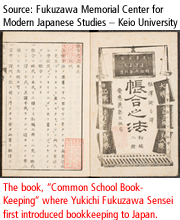About the Faculty of Business and Commerce
Spread your horizons when learning. Investigate everything thoroughly. The Faculty of Business and Commerce is the best environment for the future leaders of society.
The Faculty of Business and Commerce carries on the legacy of Yukichi Fukuzawa’s “Spirit of Jitsugaku (Practical Learning).” (See https://www.keio.ac.jp/en/about/ for further explanation of Jitsugaku.)
Our foundation principle is based on the words of our founder. “The Spirit of Jitsugaku” is not about superficial knowledge that is useful in everyday life. It is rather science, and encourages us to not be confined by conventional wisdom and socially accepted ideas. Jitsugaku enables us to base our logic and reasoning on rational empiricism to investigate phenomena and at the same time to apply the knowledge and scientific thinking to issues in the real world. In our program, we educate our students to make their own discoveries regarding issues in industrial society, come-up with solutions to these, and to find innovative ways to implement them. Students will also be encouraged to have high ethical standards and a sense of responsibility as a person in a leadership position, responsible for recreating the world we live in. It is the mission of the Faculty of Business and Commerce to send such individuals into the world
The History & Development of the Faculty of Business and Commerce
The Faculty of Business and Commerce was created at a time of great achievements by Yukichi Fukuzawa, the founder of the oldest modern university in Japan, Keio University. Since then, it continued to develop as a program in economics and became an independent faculty, as academics in the field of business and commerce reached maturity.
1873 Yukichi Fukuzawa translated Common School Bookkeeping (Bryant & Stratton) into Japanese, 「帳合之法」 (Choai-no-Ho). This was a pioneering publication in Accounting in Japan.1890 The Department of Economics was founded with the intention of sending “useful individuals into the world of business.” This program underlined the importance of subjects related to business and commerce at Keio University.1920 The courses in the Department of Economics were classified into two categories: those belonging to economics and those belonging to business and commerce.1938 The Division of Economics and the Division of Business and Commerce were established in the Department of Economics.1957 The Faculty of Business and Commerce was established as an independent faculty.- 1961The Graduate School of Business and Commerce was established.

Key Words for Understanding the Faculty of Business and Commerce
Dokuritsu Jison: Independence and Self-Respect
“Whosoever perfectly realizes the principle of Independence, both of Mind and Body, and, paying due respect to his own person, preserves his dignity unblemished―him we call a man of independence and self-respect.”
The basic spirit of Keio University is that of independence and self-respect, to protect the dignity of oneself and others and act with discretion and responsibility in every matter.
The Faculty of Business and Commerce is a place where individuals equip themselves with the fundamental skills to be such a person.
Spirit of Jitsugaku: science
Fukuzawa valued Jitsugaku, which refers to science rather than short-sighted practical disciplines. Jitsugaku calls for individuals to solve issues by thinking critically from a scientific approach in order to reveal the empirical truth.
The Faculty of Business and Commerce offers unique courses that will further develop and nurture Jitsugaku.
Hangaku-hankyo: Learning while Teaching, Teaching while Learning
Learning while Teaching, Teaching while Learning
The principle of hangaku-hankyo unites Keio members and makes no distinction between pupil and teacher, between the learned and those just beginning to learn. From Keio’s humble beginnings, there has been a spirit that students and teachers alike have the capacity to both teach and learn together.
If you would like to experience Hangaku-hankyo in full, please sign-up for the General Education Seminar in your first / second year or the seminars during your third year on.
Message from the Faculty of Business and Commerce:
To educate experienced individuals who will continue to grow, challenge problems and contribute to the progress of society.
The establishment of the Faculty of Business and Commerce coincides with the 100th anniversary of Keio University, 1957. At the end of the Edo Period, Yukichi Fukuzawa brought in systems for bookkeeping and accounting from overseas. Since then, the mission of our faculty has been to nurture comprehensive decision making skills, underscored by a tradition of academism developed over a long period in history. At the heart of this lies Fukuzawa’s Spirit of Jitsugaku and this is used to identify real issues in contemporary society and provide constructive solutions.
To those of you who are about to begin your studies at the university level, what is important now is not to decide what you are going to do after you graduate. It’s not even about identifying what your future dreams and hopes are. What is important now is to face the various issues we currently have in society in an honest way and to think about these things in earnest. What’s important is to look for solutions to these, and to pursue your dreams through doing this.
The educational philosophy of our faculty is: “Identify the issues, construct a hypothesis, examine the hypothesis, make an assertion and disseminate this claim.” Everything in this process contributes toward helping a person grow into a valuable human resource because it fosters important attributes such as the individual’s awareness of issues, abilities as well as knowledge. This will help the individual to mature into a person who is an independent minded thinker and leader who is up to facing difficult challenges, can think things through and contribute to the development of human society. Our faculty’s doors remain open to those of you who have the determination and are willing to challenge new issues and solve them.







